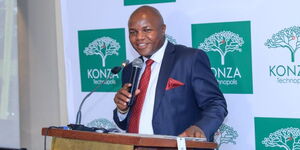Former Chief justice Willy Mutunga (2011-2016) spoke of his regrets when he got an opportunity to study law at the University of Dar Es Salaam.
In an interview with Quazini Magazine in December 2019, the former CJ revealed that when he got the opportunity to study law, what he met in the classroom was way below his expectations.
Mutunga told the publication that his journey into law was kickstarted by his teachers in the 1960s who convinced him that law was a course set aside for only smart people, a matter that created high expectations in him.
"They talked about opportunities that lay ahead in terms of practice and judiciary. There weren’t many African lawyers and competition was not stiff. Twenty students were selected from Kenya, Tanzania, and Uganda respectively. I applied and got in," he recounted.
When he got into law school, however, he discovered that what he had expected law studies to be was not exactly what he encountered in the classrooms.
"At first, I regretted taking law, it is an unthinking profession. Lawyers call themselves learned, but we are very narrow in our discipline. We tend to shun other subjects that would enhance our knowledge.
"If you are a lawyer, you need to have knowledge of economics, history, biology, science, politics, psychology, theology, philosophy, sociology…everything we deal with on a day to day basis. Everything is not ruled by rules," Mutunga opined.
He added that in his opinion, all those subjects that were being ignored would come in handy in when the lawyers had to deal with their clients caught up in various scenarios, but the lawyers were shunning them.
"When you are dealing with people who have lost their land, are fighting over succession or have been hit by vehicles, how can you be effective that if you have no knowledge of counselling? Or empathy?" he posed.
Mutunga opined that law at that level was structured and bound, with little or no wiggling room for those studying and practicing it thus limiting the profession.
His perception of the course, however, changed when he got to the Masters level when he came into more contexts under which law was taught and practised.
"It was only after I did my masters that I realized I hadn’t made a big mistake after all. Because at this point, law was taught in the economic, historical, cultural and social contexts. I was now able to catch up and broaden my knowledge," he recounted.
For this reason, Mutunga stated that his practice in law has been seen more as activism, where he interprets it as broad and with a realization that it can be used for good and evil, as opposed to sticking to the rules learned in class.
The former CJ added that he regrets not studying what he was good at before getting into law, which he told the reporter was history and literature.












